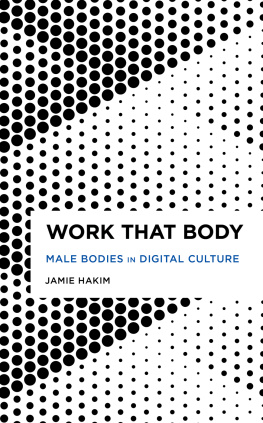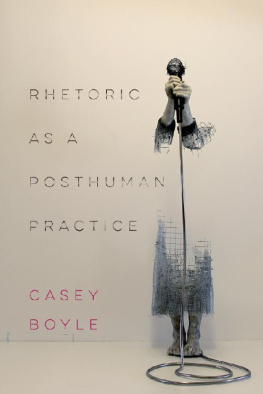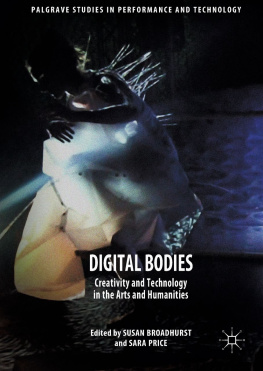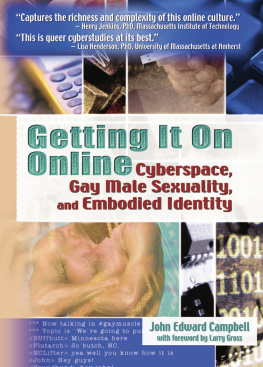Acknowledgements
This book has not been an individual endeavour. Its completion has relied on a collective of people to whom I am incredibly grateful. First and foremost, the books editor Stephen Maddison, whose encouragement, insight and commitment to materialist understandings of gender and sexuality gave me the energy to complete what, at times, seemed like an overwhelming task. Alison Winch has been instrumental to every stage of this book. Her keen sense of the scale of what confronts those of us interested in progressive politics, as well as the tools needed in their service, has been a guiding light since the inception of this project. Rachel ONeill has been a fellow traveller on a journey into trying to understand what neoliberalism has meant for both masculinity and intimacy. Her fierce ethics and intellectual creativity have kept me on my toes while writing this book, and the book is better for it. Discussing the books themes with both her and Alison in our reading group on intimacy has helped reinforce their consideration from different feminist perspectives, and this has been invaluable. Su Holmes is my official research mentor. Her mentorship goes far beyond her university-sanctioned role in a way that has been both generous and razor sharp, ensuring that every aspect of the research has been as watertight as it could possibly be. Tom Whittaker has been a sounding board for all my ideas, long before this book, and continued to be so throughout it. I owe the books title to friend and long-time collaborator Adam Mattera. A shared love of Diana Ross has meant the books title refers to Ross 1981 hit Work That Body. He suggested naming each of the chapters after the names of Diana Ross songs. And with song titles like Muscles, Love Hangover, Workin Overtime that might have been possible, but in the end I decided against.
All of the aforementioned people have read sections of this book and have given invaluable feedback. Others have too. They are Yvonne Tasker, Ben Little, Sanna Inthorn and Zeena Feldman. Catherine Rottenbergs patient and thoughtful feedback really strengthened the framing of the project and gave me the courage to make its intervention bolder than it was. Catherine and the rest of my comrades in the Care Collective Andreas Chatzidakis, Jo Littler and Lynne Segal have bolstered my conviction that intellectual enquiry should be theoretical, but it needs to be conducted politically, with an object in mind, collectively supported and always with great care, in all the senses of that word. The same is true for the Exclusive Faggotry group Joao Florencio, John Mercer and Charlie Sarson whose humour, wide knowledge of gay sexual cultures and way with a witty GIF kept me going throughout. John, in particular, has been especially supportive to me all throughout the beginning of my academic career. University of East Anglias Feminist Media Studies group a group of brilliant female scholars has provided a similarly supportive and encouraging network.
I am also grateful to the following people, who invited me to speak at different occasions and have, therefore, allowed me to test out and sharpen the ideas that eventually made into this book: Kath Albury, Pam Aldred, Kerryn Drysdale, Wing Fai-Lung, Jaime Garcia Iglesias, Benjamin Litherland, Chris Porter, Kirsten Schuster and Diego Semerene. I am especially grateful for my Visiting Research Fellowship at the Australian Research Centre in Sex, Health and Society at LaTrobe University in December 2018. Dennis Altman, Steven Angelides, Gary Dowsett, Duane Duncan, Ivy McGowan, David OKeefe and Andrea Waling all made for a very stimulating and productive visit. I should thank Adam Bourne in particular, not only for being such a brilliant host but especially when it came to the research I have done on chemsex, for providing a model for what robust, rigorous and, especially in such a fraught research area, measured research should look like.
Shaka McGlotten and Corey W. Johnson saw the first proposal for the book and made excellent suggestions that improved it from the outset. I am also thankful for the conversations I have had at conferences, symposia and other events that have made me reflect on the work I have done in this project with the following people: Sarah Banet-Weiser, Paul Byron, Debbie Ging, Susanna Passonen, Kristian Moller, Sharif Mowlabocus and Kane Race.
I am always thankful for my family: my parents, Paul and Sophie, and niece Ava for the limitless amounts of love and support they give me and that has sustained me throughout the process. And, of course, Davide and Noah, to whom this book is dedicated and without whom it would probably not have been finished.
Earlier versions of the work that appears in this book has already appeared as the following:
Jamie Hakim, Fit Is the New Rich: Male Embodiment in the Age of Austerity, Soundings, 61 (2015): 8494.
Jamie Hakim, The Spornosexual: The Affective Contradictions of Male Body-Work in Neoliberal Digital Culture, Journal of Gender Studies, 27:2 (2018): 231241.
Jamie Hakim, Chemsex: Anatomy of a Sex Panic in Affect and Social Media, eds. Darren Ellis, Stephen Maddison and Tony Sampson (London: Rowman & Littlefield, 2018), 131140.
Jamie Hakim, The Rise of Chemsex: Queering Collective Intimacy in Neoliberal London, Cultural Studies, 2 (2019): 249275.
Jamie Hakim and Alison Winch, Im Selling the Dream Really Arent I?: Sharing Fit Male Bodies on Social Networking Sites in Digital Leisure Cultures: Critical Perspectives, eds. Sandro Carnicelli, David McGillivray and Gayle McPherson (London: Routledge, 2016), 3952.
Bibliography
Abidin, Crystal and Joel Gwynne. Entrepreneurial Selves, Feminine Corporeality and Lifestyle Blogging in Singapore, Asian Journal of Social Science, 45 (2017): 385408.
Adkins, Lisa. Out of Work or Out of Time? Rethinking Labor after the Financial Crisis, South Atlantic Quarterly, 111:4 (2012): 621664.
Aitkenhead, Decca. RuPaul: Drag Is a Big F-You to Male-Dominated Culture, The Guardian, last modified 3 March 2018, https://www.theguardian.com/tv-and-radio/2018/mar/03/rupaul-drag-race-big-f-you-to-male-dominated-culture
Andersson, Johan. Vauxhalls Post-Industrial Pleasure Gardens: Death Wish and Hedonism in 21st-Century London, Urban Studies, 48:1 (2011): 85100.
Attwood, Feona, ed. Porn.Com: Making Sense of Online Pornography. Oxford: Peter Lang, 2010.
Attwood, Feona, Clare Bale and Meg Barker. The Sexualisation Report (Milton Keynes: Open University, 2013).
Banet-Weiser, Sarah. Authentic TM: Politics and Ambivalence in a Brand Culture. New York: New York University Press, 2012.
Banet-Weiser, Sarah and Inna Arzumanova. Creative Authorship: Self-Actualising Individuals and the Self-Brand in Media Authorship, edited by Cynthia Chris and David A. Gerstner (London: Routledge, 2013): 163179.
Banet-Weiser, Sarah and Jack Braitch. The Con in Confidence: Pick Up Artists, Honor Terrorism and the Failure of Neoliberalism, pre-publication version.
Barcan, Ruth. Nudity: A Cultural Anatomy. Oxford: Berg, 2004.
Beck, Ulrich and Elizabeth Beck-Gernsheim. The Normal Chaos of Love. Cambridge: Polity Press, 1995.
Beckman, Frida. Between Desire and Pleasure: A Deleuzian Theory of Sexuality. Edinburgh: Edinburgh University Press, 2013.
Berkowitz, Dana and Linda Liska Belgrave, She Works Hard for the Money: Drag Queens and the Management of Their Contradictory Status of Celebrity and Marginality, Journal of Contemporary Ethnography, 39:2 (2010): 159186.









